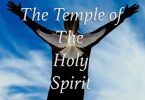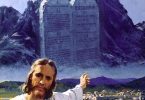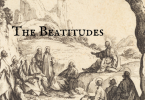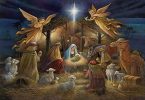4th Sunday of Advent (Year B)
Scripture: 2 Sam. 7:1-5, 8-11, 16; Ps. 88: 2-5, 27, 29; Rom. 16:25-27; Lk. 1:26-38
This fourth Sunday culminates the season of Advent. The fourth week and the fourth Sunday of advent help us to reflect on the first coming of Christ. We have already begun to ponder on the actual coming of Christ from 17th December onwards. The day’s reading helped us to trace the genealogy of Jesus. The genealogy of Jesus has so much treasure to reflect upon. One of the main insights is the confirmation of Jesus being the son of David. The people of Israel looked at King David as the anointed one of God and the saviour of Israel. It was under his kingship that they were united and emerged as one nation. The people of Israel were longing to have a son of David so that he may bring peace to them. because they had lost everything over the years. They had lost their peace, identity and political freedom, etc. They were reduced to slavery once again. Today’s liturgy prepares us to know the true identity of Jesus. so that his birth may be celebrated in a meaningful way.
Today’s first reading gives us a glimpse of the Davidic period. The very first verse of the reading sets the tone. It summarizes the prosperity of King David. He had built a palace for himself. The Lord had given him rest from his enemies. In such peaceful atmosphere, David thought of building a house for the Lord. The Jews believed the presence of Yahweh in the Ark of God. It was put on the mobile cart and kept in the tent. The Israelites took the Ark wherever they needed God’s presence in their midst. They took it even during the battle. They felt the strong presence of God in the Ark of God.
David’s idea of building a temple for the Lord was bright and novel. Prophet Nathan initially approved it. But the Lord had different plans; He revealed the plan to Nathan that He would make David’s house and sovereignty stand secure forever. Instead of David making a house for God, God himself made a house of David. When David’s dynasty lost its power and the Israelites were taken to exile, this prophecy became the basis of a messianic expectation to the people of Israel. The succeeding verses of the first reading in today’s liturgy tell the promise God made to David. He said, “when your days are over and you rest you’re your fathers, I will raise up your offspring to succeed you, who will come from you’re your own body, and I will establish his kingdom. He is the one who will build a house for my name, and I will establish the throne of his kingdom forever” (2 Sam. 7:12-13).
The Later prophets of the Old testament made prophesies based on this promise about the coming of the messiah from the lineage of David. Prophet Isaiah said, “Therefore the Lord Himself will give you a sign: Behold, a virgin will be with child and bear a son, and she will call His name Immanuel.” (Is. 7:14). He later said, “For a child will be born to us, a son will be given to us, And the government will rest on His shoulders; And His name will be called Wonderful Counselor, Mighty God, Eternal Father, Prince of Peace. There will be no end to the increase of His government or of peace, On the throne of David and over his kingdom, to establish it and to uphold it with justice and righteousness from then on and forevermore. The zeal of the LORD of hosts will accomplish this.” (Is. 9:6-7). Prophet Micah also foretold the coming of the messiah. He said, “But as for you, Bethlehem Ephrathah, too little to be among the clans of Judah, from you. One will go forth for Me to be a ruler in Israel. His goings forth are from long ago, from the days of eternity.” Therefore, He will give them up until the time when she who is in labour has borne a child” (Mic 5:1-3).
The New Testament and especially the gospels also revealed to us that there were people waiting to see the messiah. King Herod took counsel from the learned after meeting the wise men. They revealed the scriptures to him that the Messiah would be born. (Mt 2:1-6) Holy men and women like Simeon and Anna were waiting to see the Lord. When Simeon saw baby Jesus, he proclaimed that he would now depart in peace (Lk 2: 28). John the Baptist also waited to see the arrival of the Messiah. (Lk. 7:19-23)
The gospel text of today’s liturgy is the fulfilment of the Old Testament prophecies about the messiah. It narrates the scene of the annunciation. The angel brought good news to Mary that she would bear a son and he would be great and will be called the son of the Most High. There are two references to David in the same text. First one comes while introducing Joseph. He came from the linage of David. The second one is referred to as the throne of David. The angel promised Mary that the son of God would rule over the house of Jacob forever and his reign will have no end.
Although Mathew showed Joseph coming from the lineage of David, there are several passages in the New Testament which show that Mary was also descendent from the lineage of David. St. Paul in his letters referred to Jesus as the seed of David, he believed that Jesus had the lineage of David. (Rom. 1:3, 2 Tim. 2:8). Luke also saw Jesus being the son of David from the ancestry of Mary. It was a custom that the bridegroom (Joseph) would choose the bride (Mary) from his own clan. This explanation would then be in accordance with the fact that Jesus’ origin was not human but divine. That is to say that Jesus was born from the Holy Spirit and Joseph was just the foster father of Jesus.
The patristic writings have accepted this fact that Mary was a descendent of David. It appeared in the writings of Tertullian (+220) This view was upheld by Ambrose, Jerome, Hesichius of Jerusalem, Pope Leo the Great and most explicitly Paschasius Radbertus (+ 859). The Litany of Loreto also calls Mary as the tower of David. Mary is compared to a not further known building of old Jerusalem used in the Song of Songs to describe the beauty of the bride (4:4).
The title son of David expresses that Jesus is the long-awaited Messiah. He is the fulfilment of all the old testament prophecies. He is the saviour of mankind. When we recognize Jesus as the saviour, the long-awaited Messiah and the fulfilment of Old Testament prophecies; we need to simply follow the advice of the psalmist and St. Paul. They give us two pieces of advice. First, the psalmist says, we must sing forever for the love of God because God had made a promise to David that He would establish his dynasty forever and set his throne for all ages. Now God has fulfilled His promise in Jesus Christ. For this reason, St. Paul says we must give glory to God through Jesus Christ forever and ever. Second, we must proclaim this good news to everyone. It should be proclaimed to the non-believers too.
Today’s liturgy helps us to know the identity of Jesus, the son of David, the son of the Most High. It will help us to celebrate the nativity of our Lord in a meaningful way. May we truly accept Jesus as the messiah of our lives.






